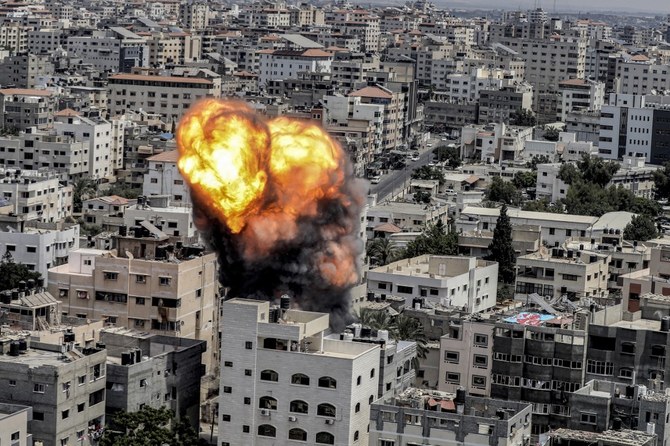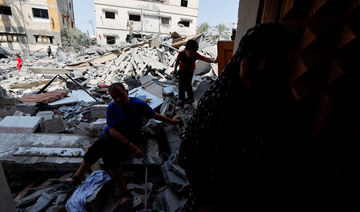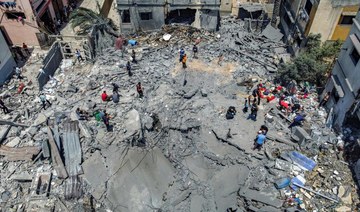GAZA/JERUSALEM: Israeli airstrikes flattened homes in Gaza on Saturday and rocket barrages into southern Israel persisted, raising fears of an escalation in a conflict that has killed at least 15 people in the coastal strip.
The fighting began with Israel’s killing of a senior commander of the Palestinian Islamic Jihad militant group in a wave of strikes Friday that Israel said were meant to prevent an imminent attack. A 5-year-old girl and two women are among those killed in the strikes.
So far, Hamas, the larger militant group that rules Gaza, appeared to stay on the sidelines of the conflict, keeping its intensity somewhat contained. Israel and Hamas fought a war barely a year ago, one of four major conflicts and several smaller battles over the last 15 years that wreaked a staggering cost to the impoverished territory’s 2 million Palestinian residents.
Whether Hamas continues to stay out of the fight likely depends in part on how much punishment Israel inflicts in Gaza as rocket fire steadily continues.
On Saturday afternoon, Israeli warplanes stepped up strikes with hits on four residential buildings in Gaza City, all locations apparently linked to Islamic Jihad militants. The destruction was the heaviest yet in the current exchange within the densely packed city, but there were no reports of casualties. In each case, the Israeli military warned residents ahead of the strikes.
Another strike Saturday hit a car, killing a 75-year-old woman and wounding six other people.
In one of the strikes, after the warnings, fighter jets dropped two bombs on the house of an Islamic Jihad member. The blast flattened the two-story structure, leaving a large rubble-filled crater, and badly damaged surrounding homes.
Women and children rushed out of the area.
“Warned us? They warned us with rockets and we fled without taking anything,” said Huda Shamalakh, who lived next door. She said 15 people lived in the targeted home.
The lone power plant in Gaza ground to a halt at noon Saturday for lack of fuel as Israel has kept its crossing points into Gaza closed since Tuesday. With the new disruption, Gazans can get only 4 hours of electricity a day, increasing their reliance on private generators and deepening the territory’s chronic power crisis amid peak summer heat.
Throughout the day, Gaza militants regularly launched rounds of rockets into southern Israel, but there were no reports of casualties. Most barrages were intercepted by Israel’s Iron Dome missile-defense system, hit in empty areas or fell short into Gaza. Rocket shrapnel damaged the roof of a home in the city of Sderot, but the family was in a shelter.
On Friday evening, Israeli Prime Minister Yair Lapid said in a televised speech that “Israel isn’t interested in a broader conflict in Gaza but will not shy away from one either.”
“This government has a zero-tolerance policy for any attempted attacks — of any kind — from Gaza toward Israeli territory,” he said. “Israel will not sit idly by when there are those who are trying to harm its civilians.”
The violence poses an early test for Lapid, who assumed the role of caretaker prime minister ahead of elections in November, when he hopes to keep the position.
Lapid, a centrist former TV host and author, has experience in diplomacy having served as foreign minister in the outgoing government, but has thin security credentials. A conflict with Gaza could burnish his standing and give him a boost as he faces off against former Prime Minister Benjamin Netanyahu, a security hawk who led the country during three of its four wars with Hamas.
Hamas also faces a dilemma in deciding whether to join a new battle barely a year after the last war caused widespread devastation. There has been almost no reconstruction since then, and the isolated coastal territory is mired in poverty, with unemployment hovering around 50 percent. Israel and Egypt have maintained a tight blockade over the territory since the Hamas takeover in 2007.
Egypt on Saturday intensified efforts to prevent escalation, communicating with Israel, the Palestinians and the United States to keep Hamas from joining the fighting, an Egyptian intelligence official said. The official spoke on condition of anonymity because he was not authorized to talk to the media.
The Palestinian Health Ministry put the toll at 15 killed and said more than 80 were wounded. The ministry did not differentiate between civilians and militants. The Israeli military said early estimates were that around 15 fighters were killed.
The latest round of Israel-Gaza violence was rooted in the arrest earlier this week of a senior Islamic Jihad leader in the West Bank, part of a monthlong Israeli military operation in the territory. A teen Islamic Jihad member was also killed in a gunbattle.
Israel then closed roads around Gaza and sent reinforcements to the border, warning of retaliation. On Friday, it killed Islamic Jihad’s commander for northern Gaza, Taiseer Al-Jabari, in a strike on a Gaza City apartment building.
An Israeli military spokesman said the strikes were in response to an “imminent threat” from two militant squads armed with anti-tank missiles.
Other Israeli strikes overnight largely hit on the outskirts of Gaza City or in rural areas, targeting what Israel said were rocket launchers, rocket building sites and Islamic Jihad camps.
Overnight, Israeli media showed the skies above southern and central Israel lighting up with rockets and interceptors from Israel’s Iron Dome missile-defense system.
The UN special envoy to the region, Tor Wennesland, said: “The launching of rockets must cease immediately, and I call on all sides to avoid further escalation.”
Defense Minister Benny Gantz approved an order to call up 25,000 reserve soldiers if needed while the military announced a “special situation” on the home front, with schools closed and limits placed on activities in communities within 80 kilometers (50 miles) of the border.
Hamas seized power in Gaza from rival Palestinian forces in 2007, two years after Israel withdrew from the coastal strip. Its most recent war with Israel was in May 2021. Tensions soared again earlier this year following a wave of attacks inside Israel, near-daily military operations in the West Bank and tensions at a flashpoint Jerusalem holy site.
Iran-backed Islamic Jihad is smaller than Hamas but largely shares its ideology. Both groups oppose Israel’s existence and have carried out scores of deadly attacks over the years, including the firing of rockets into Israel.
Air strikes, rocket attacks push Israel, Gaza into second day of fighting
https://arab.news/vtkey
Air strikes, rocket attacks push Israel, Gaza into second day of fighting

- Early on Saturday Israel broadened its operation against Islamic Jihad, a group that is aligned with Hamas but often acts independently
Saudi Arabia’s Crown Prince Mohammed bin Salman arrives in Manama for Arab League Summit 2024

MANAMA: Saudi Arabia’s Crown Prince Mohammed bin Salman was among the Arab delegates who arrived in Manama for the Arab League Summit.
The one-day summit will discuss the situation in Gaza, propose ceasefire and push for a two-state solution in Palestine to achieve regional peace.
Qatar’s Emir Tamim bin Hamad Al Thani, UAE’s Vice President and Prime Minister Mohammed bin Rashid, and Kuwait’s Prime Minister Sheikh Ahmad Abdullah Al-Ahmad Al-Sabah were among the arrivals on Thursday.
Lebanon media says Israel struck Hezbollah eastern stronghold overnight

- Israel and Hamas ally Hezbollah have exchanged near-daily fire following the Palestinian group’s October 7 attack on southern Israel that sparked the war in Gaza
Beirut: Lebanese state-run media reported Thursday an overnight Israeli air raid on eastern Lebanon, where Hezbollah holds sway, hours after the Iran-backed armed group launched an attack deep into Israeli territory.
Israel and Hamas ally Hezbollah have exchanged near-daily fire following the Palestinian group’s October 7 attack on southern Israel that sparked the war in Gaza, now in its eighth month.
Lebanon’s official National News Agency said that “the outskirts of the eastern Lebanon mountain range, at midnight (2100 GMT Wednesday), was subjected to five enemy raids.”
The strikes in the Baalbek area “slightly injured a citizen” and caused fires, the report added.
A source close to Hezbollah told AFP that one of the strikes “hit a Hezbollah military camp.”
An Israeli army spokesman told AFP: “I can confirm that an airstrike was indeed conducted deep in Lebanon against a terror target related to Hezbollah’s precision missile project.”
The area of Baalbek in the Bekaa valley is a Hezbollah bastion, bordering Syria.
Hezbollah launchrocket barrage at Israeli positions
Lebanon’s Iran-backed Hezbollah group said it launched on Thursday “more than 60” rockets at Israeli military positions in retaliation for overnight air strikes.
Hezbollah fighters “launched a missile attack with more than 60 Katyusha rockets” on several Israeli military positions including in the Israeli-annexed Golan Heights, the group said in a statement, adding it was “in response to the Israeli enemy’s attacks last night on the Bekaa region” in Lebanon’s east.
The cross-border fighting has killed at least 413 people in Lebanon, mostly militants but also including dozens of civilians, according to an AFP tally.
Israel says 14 soldiers and 10 civilians have been killed on its side of the border.
Tens of thousands of people have been displaced in areas on both sides of the border.
The top UN court holds hearings on Israeli military incursion into Rafah

- It is the fourth time South Africa has asked the ICJ for emergency measures
- South Africa has asked the court to order Israel to withdraw from Rafah
THE HAGUE: The United Nations’ top court opens two days of hearings on Thursday into a request from South Africa to make sure Israel halts its military operation in the southern Gaza city of Rafah, where more than half of Gaza’s population has sought shelter.
It is the fourth time South Africa has asked the International Court of Justice for emergency measures since the nation launched proceedings alleging that Israel’s military action in its war with Hamas in Gaza amounts to genocide.
According to the latest request, the previous preliminary orders by The Hague-based court were not sufficient to address “a brutal military attack on the sole remaining refuge for the people of Gaza.”
Israel has portrayed Rafah as the last stronghold of the militant group, brushing off warnings from the United States and other allies that any major operation there would be catastrophic for civilians.
South Africa has asked the court to order Israel to withdraw from Rafah; to take measures to ensure unimpeded access for UN officials, humanitarian organizations and journalists to the Gaza Strip; and to report back within one week on how it is meeting these demands.
During hearings earlier this year, Israel strongly denied committing genocide in Gaza and said it does all it can to spare civilians and is only targeting Hamas militants. It says Hamas’ tactic of embedding in civilian areas makes it difficult to avoid civilian casualties.
In January, judges ordered Israel to do all it can to prevent death, destruction and any acts of genocide in Gaza, but the panel stopped short of ordering an end to the military offensive that has laid waste to the Palestinian enclave.
In a second order in March, the court said Israel must take measures to improve the humanitarian situation in Gaza, including opening more land crossings to allow food, water, fuel and other supplies to enter.
Most of Gaza’s population of 2.3 million people have been displaced since fighting began.
The war began with a Hamas attack on southern Israel on Oct. 7 in which Palestinian militants killed around 1,200 people and took about 250 hostages. Gaza’s Health Ministry says over 35,000 Palestinians have been killed in the war, without distinguishing between civilians and combatants in its count.
South Africa initiated proceedings in December 2023 and sees the legal campaign as rooted in issues central to its identity. Its governing party, the African National Congress, has long compared Israel’s policies in Gaza and the occupied West Bank to its own history under the apartheid regime of white minority rule, which restricted most Blacks to “homelands.” Apartheid ended in 1994.
On Sunday, Egypt announced it plans to join the case. The Ministry of Foreign Affairs said Israeli military actions “constitute a flagrant violation of international law, humanitarian law, and the Fourth Geneva Convention of 1949 regarding the protection of civilians during wartime.”
Several countries have also indicated they plan to intervene, but so far only Libya, Nicaragua and Colombia have filed formal requests to do so.
Israeli defense chief challenges Netanyahu over post-war Gaza plans

- Defense Minister Yoav Gallant vows to oppose any long-term military rule by Israel over Gaza
- Netanyahu accuses Gallant of making ‘excuses’ for not yet having destroyed Hamas in the conflict
JERUSALEM: Israeli Prime Minister Benjamin Netanyahu was publicly challenged about post-war plans for the Gaza Strip on Wednesday by his own defense chief, who vowed to oppose any long-term military rule by Israel over the ravaged Palestinian enclave.
The televised statement by Defense Minister Yoav Gallant marked the most vocal dissent from within Israel’s top echelon against Netanyahu during a seven-month-old and multi-front conflict that has set off political fissures at home and abroad.
Netanyahu hinted, in a riposte which did not explicitly name Gallant, that the retired admiral was making “excuses” for not yet having destroyed Hamas in a conflict now in its eight month.
But the veteran conservative premier soon appeared to be outflanked within his own war cabinet: Centrist ex-general Benny Gantz, the only voting member of the forum other than Netanyahu and Gallant, said the defense minister had “spoke(n) the truth.”
While reiterating the Netanyahu government’s goals of defeating Hamas and recovering remaining hostages from the Oct. 7 cross-border rampage by the faction, Gallant said these must be complemented by laying the groundwork for alternative Palestinian rule.
“We must dismantle Hamas’ governing capabilities in Gaza. The key to this goal is military action, and the establishment of a governing alternative in Gaza,” Gallant said.
“In the absence of such an alternative, only two negative options remain: Hamas’ rule in Gaza or Israeli military rule in Gaza,” he added, saying he would oppose the latter scenario and urging Netanyahu to formally forswear it.
Gallant said that, since October, he had tried to promote a plan to set up a “non-hostile Palestinian governing alternative” to Hamas — but got no response from the Israeli cabinet.
The format of his broadside, a pre-announced news conference carried live by Israeli TV and radio, recalled Gallant’s bombshell warning in March 2023 that foment over a judicial overhaul pursued by Netanyahu was threatening military cohesion.
At the time, Netanyahu announced that Gallant would be fired — but backed down amid a deluge of street demonstrations. Some defense analysts believe Gallant’s prediction was borne out by Hamas’ ability to blindside Israeli forces a few months later.
Asked on Wednesday whether he was worried he may again face being ousted, Gallant said: “I’m not blaming anyone. In a democratic country, I believe, it’s appropriate for a person, especially the defense minister who holds a position, to make it public.”
Gallant’s Gaza criticism recalled that of Israel’s chief ally, the United States, which has sought to parlay the war into a role for the internationally backed Palestinian Authority (PA), which wields limited governance in the occupied West Bank.
Netanyahu has refused this, describing the PA as a hostile entity — and repeated this position in a video statement he issued on social media within an hour of Gallant’s remarks.
Any move to create an alternative Gaza government requires that Hamas first be eliminated, Netanyahu said, finishing with the demand that this objective be pursued “without excuses.”
Netanyahu’s ruling coalition includes ultra-nationalist partners who want the PA dismantled and new Jewish settlements in the Gaza Strip. Those partners have at times sparred with Gallant, a member of Netanyahu’s Likud party, over policy.
Netanyahu has said Israel would retain overall security control over Gaza after the war for the foreseeable future. He has stopped short of describing this scenario as an occupation — a status Washington does not want to see emerge — and has signalled opposition to Israelis settling the territory.
Over the last week, Israeli ground forces have returned to some areas of northern Gaza that they overran and quit in the first half of the war. Israel describes the new missions as planned crackdowns on efforts by Hamas holdouts to regroup, while Palestinians see evidence of the tenacity of the gunmen.
Briefing reporters on Tuesday, chief military spokesperson Rear Admiral Daniel Hagari was asked whether the absence of a post-Hamas strategy for Gaza was complicating operations.
“There is no doubt that an alternative to Hamas would generate pressure on Hamas, but that’s a question for the government echelon,” he responded.
Pro-Turkiye Syria mercenaries head to Niger to earn cash

- At least 1,000 fighters have been sent to Niger in recent months “to protect Turkish projects and interests,” says Syrian war monitor SOHR
- Niger borders oil-rich Libya, and in 2020, Washington accused Turkiye-linked SADAT of sending Syrian fighters to Libya
BEIRUT: Like hundreds of other pro-Turkish fighters, Omar left northern Syria for mineral-rich Niger last year, joining Syrian mercenaries sent to the West African nation by a private Turkish military company.
“The main reason I left is because life is hard in Syria,” fighter Omar, 24, told AFP on message app WhatsApp from Niger.
In northern Syria “there are no job opportunities besides joining an armed faction and earning no more than 1,500 Turkish lira ($46) a month,” Omar said, requesting like others AFP interviewed to be identified by a pseudonym for security reasons.
Analysts say Ankara has strong ties with the new military regime in Niamey, in power since a July 2023 coup.
And in recent months, at least 1,000 fighters have been sent to Niger “to protect Turkish projects and interests,” said the Syrian Observatory for Human Rights war monitor.
For the past decade, Turkiye has been increasing its footprint in Niger, mostly through “humanitarian aid, development and commerce,” said Gabriella Korling, a researcher focusing on the Sahel at the Swedish Defense Research Agency.
“The defense component of the relation between Niger and Turkiye has become more important over time with the signing of a military cooperation agreement in 2020 and the sale of armed drones,” Korling said.
Niamey often refers to Turkiye, Russia and China as “partners that are respectful of Niger’s sovereignty,” she added.
Omar, who supports his mother and three siblings, said since leaving his home in August he receives a “very good” monthly salary of $1,500 for his work in the West African nation.
He hopes his earnings will help him start a small business and quit the battlefield, after years working as a fighter for a pro-Ankara faction.
Tens of thousands of young men have joined the ranks of jihadist factions and others loyal to Ankara in Syria’s north and northwest, where four million people, half of them displaced, live in desperate conditions.
Omar said he was among a first batch of more than 200 fighters who left Syria’s Turkish-controlled north in August for Niger.
He is now readying to return home after his six-month contract, renewed once, ended.
He and two other pro-Ankara Syrian fighters who spoke to AFP in recent weeks said they had enlisted for work in Niger with the Sultan Murad faction, one of Turkiye’s most loyal proxies in northern Syria.
They said they had signed six-month contracts at the faction’s headquarters with private firm SADAT International Defense Consultancy.
“SADAT officers came into the room and we signed the contract with them,” said fighter Ahmed.
“They handle everything,” from travel to accommodation, added the 30-year-old, who was readying to travel from northern Syria to Niger.
The company is widely seen as Ankara’s secret weapon in wars across North Africa and the Middle East, although its chief denied the allegation in a 2021 interview with AFP.
Niger borders oil-rich Libya, and in 2020, Washington accused SADAT of sending Syrian fighters to Libya.
Turkiye has sent thousands of Syrian fighters to Libya to buttress the Tripoli government, which it backs against rival Russian-backed authorities in the east according to the Observatory and the Syria Justice and Accountability Center.
The Center said SADAT was “responsible for the international air transport of mercenaries once they crossed into Turkish territory” to go to Libya and Nagorno-Karabakh.
Turkiye has also sent Syrian fighters to bolster Azerbaijan in its conflict with Armenia in Nagorno-Karabakh, but its efforts to send mercenaries to Niger have been shrouded in secrecy.
Turkiye’s defense ministry told AFP: “All these allegations are false and have no truth.”
Omar said his journey took him to Gaziantep in Turkiye, then to Istanbul, where he boarded a military plane to Burkina Faso before being driven under escort to camps in neighboring Niger.
After two weeks of military training, he was tasked with guarding a site near a mine, whose name he said he didn’t know.
He said he and other Syrians worked alongside Nigeriens in military fatigues, but was unable to say if they were soldiers.
“They divided us into several groups of guards and fighters,” he said.
Another group “was sent to fight Boko Haram (jihadists) and another was sent to Lome” in neighboring Togo, he said, without providing details about their mission.
His family collects his monthly salary, minus a $350 fee for his faction.
Ahmed, who has been a fighter for 10 years, said he had been told his mission would consist of “protecting military positions” after undergoing training.
He said “there could be battles” at some point, but did not know who he would be fighting.
The father of three said he spent six months in Libya in 2020 earning more than $2,000 a month.
In July 2023, the army seized power in Niger, ending security and defense agreements with Western countries including France, which has withdrawn forces who were fighting jihadists.
“The coup in 2023 did not disrupt diplomatic relations between Turkiye and Niger,” researcher Korling added, pointing to the appointment of the first Turkish defense attache to Niger earlier this year.
Last year, Turkish state television opened a French-language channel covering Africa, and Ankara operates daily flights to Niamey.
“Turkiye, given its religious proximity and lack of political and historical baggage, is looked upon quite favorably in Niger especially in comparison to” Western countries, said Korling.
Rami Abdel Rahman, who heads the Britain-based Syrian Observatory for Human Rights, said Turkiye was “exploiting” impoverished men in areas under its control “to recruit them as mercenaries in military operations” serving Ankara’s foreign interests.
The war monitor and other human rights groups said promises of lucrative payments to mercenaries sent abroad are not always kept.
Mohammad Al-Abdallah of the Syria Justice and Accountability Center said his organization had for example documented “false promises of granting Turkish citizenship” to those sent to Azerbaijan or Libya.
Abdul Rahman noted reports that about 50 Syrian fighters had been killed in Niger, mostly after they were attacked by jihadists, but he said his organization had only verified nine deaths, with four bodies having been repatriated.
A source within a faction whose members have been dispatched to Niger said about 50 bodies were expected to return in the coming days.
For Abed, a 30-year-old Syrian who has been displaced with his family for more than a decade, death is a risk he has decided to take.
The father of four and sole breadwinner told AFP: “I’m scared of dying... but maybe I could die here” too.
The difference, he said, is that in Syria “I would die for 1,000 Turkish liras ($30), and (in Niger) I would die for $1,500.”
str-lar/aya/lg/jkb




















